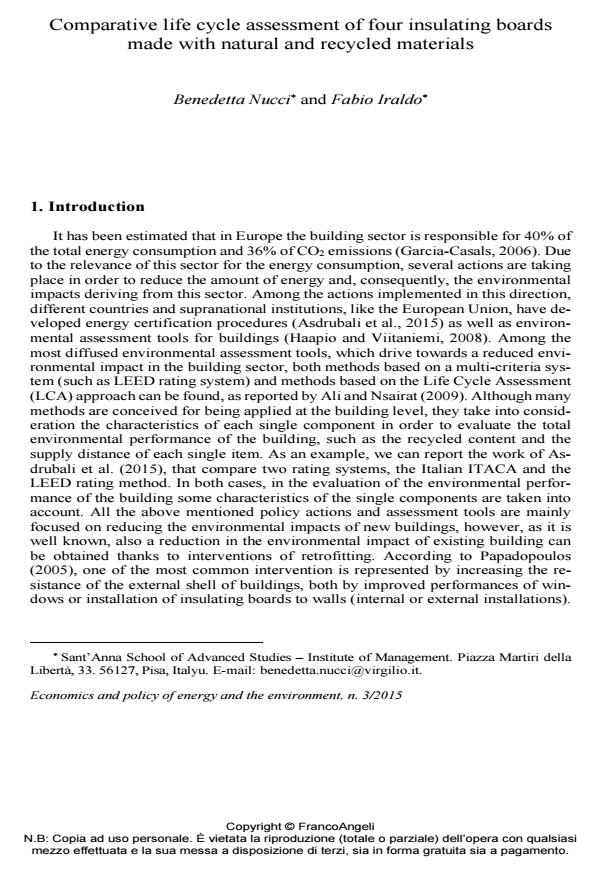Comparative life cycle assessment of four insulating boards made with natural and recycled materials
Journal title ECONOMICS AND POLICY OF ENERGY AND THE ENVIRONMENT
Author/s Benedetta Nucci, Fabio Iraldo
Publishing Year 2016 Issue 2015/3
Language English Pages 18 P. 71-88 File size 800 KB
DOI 10.3280/EFE2015-003004
DOI is like a bar code for intellectual property: to have more infomation
click here
Below, you can see the article first page
If you want to buy this article in PDF format, you can do it, following the instructions to buy download credits

FrancoAngeli is member of Publishers International Linking Association, Inc (PILA), a not-for-profit association which run the CrossRef service enabling links to and from online scholarly content.
Purpose. This paper quantifies and compares the environmental impacts calculated with Life Cycle Assessment (LCA) for four different insulating boards made with natural or recovered fibers: recycled PET, recycled textile, hemp and sheep wool fibers. Methods. The environmental impacts of the different boards are compared using as functional unit 1 R of thermic resistance and the system boundaries are taken from cradle to grave. Moreover, the length of the use phase necessary to balance the CO2 emissions linked to the life cycle of each insulating board has been assessed. Results and discussion. The results of the comparative LCA and a contribution analysis are reported in order to highlight the main sources of environmental impact. The insulating boards made with sheep wool and recycled textile show the lowest environmental impact for almost all the impact categories considered in the analysis and require the shortest use time in order to balance the CO2 emissions of the life cycle (5 months). If the CO2 uptake from the atmosphere is included in the calculation, the insulating board made with hemp outperform the other boards in impact category "climate change" and in the "offsetting period" (less than 1 month). Conclusions. The paper concludes that the use of insulating boards, in particular made with recycled or natural materials, can represent an important step towards the increase of the sustainability of the building sector. In addition, LCA results should increasingly be included in rating systems and schemes in the building sector in order to effectively lead this sector toward sustainability.
Keywords: Life cycle assessment, insulation, recycled PET, sheep wool, hemp, recycled textile.
Jel codes: Q51, L74, M40.
- Impact of structural system type and thermal insulation material on the internal floor area of residential buildings. Paweł Mika, Yifan Jing, in Środowisko Mieszkaniowe/Housing Environment /2025 pp.96
DOI: 10.2478/he-2025-0032
Benedetta Nucci, Fabio Iraldo, Comparative life cycle assessment of four insulating boards made with natural and recycled materials in "ECONOMICS AND POLICY OF ENERGY AND THE ENVIRONMENT" 3/2015, pp 71-88, DOI: 10.3280/EFE2015-003004